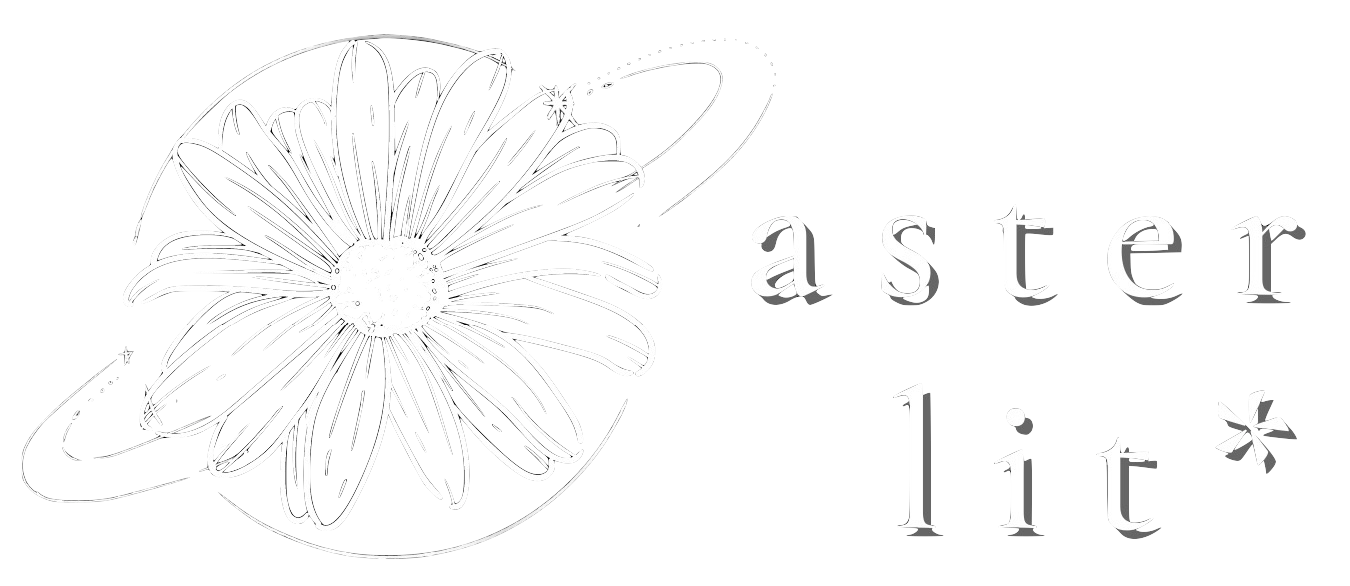
Aster Lit: translatability
Issue 12- Summer 2024
Q&A with Leela Raj-Sankar
For “Fantasia”
Your imagery within the piece is incredibly striking, but so are the moments where you just come out and say how you feel (ex. "Am I even Indian if I can’t speak the language?") How do you feel the contrast between your surreal lines and forthright moments like this push the message of your poem across?
I wanted this poem to read as more down-to-earth than the ones I normally write. I wanted there to be several moments where the verse felt like a prose piece, or even conversational, inviting the audience to witness them. The contrast between the "dreamlike" feel of the poem and forthright moments was meant to create several "pauses" in the poem, where the audience and speaker alike are shaken out of their respective trances. This poem, to me, toes the line between perception and reality, between one culture and another, and the moments of speaking directly to the reader are meant to focus them on that divide.
How did you envision the structure of this piece influencing the title, or vice versa?
I originally wrote this piece for my chapbook Heat Death of the Universe, which came out with Fifth Wheel Press in 2023. The first version wasn't meant to be a standalone poem - it was intended as a somewhat climactic synthesis of the themes that the first half of the book had already introduced. That's certainly a part of the reason that I chose that particular structure; I wanted it to be more visually striking than the rest of the poems in the book. With regards to the title, I had actually been listening to a lot of Chopin (as always) while putting together my manuscript. In classical music, a fantasia is characterized by improvisation, and doesn't necessarily follow the rules of a particular music form. I wanted this poem to read improvisationally too, reflecting the jumbled and chaotic nature of the speaker's identity, as if the words were spilling out almost uncontrollably, disjointed in the same way my Hindi and Tamil are. I wanted the reader's normative experience of reading a poem to be distorted, to simulate the feeling of trying to translate or convey a feeling that no language has the words for. But I had also hoped for the title and structure to reflect the dreamlike nature of the poem, and the speaker's obsession with their (somewhat misguided, at points) idea of their own ethnicity.
You allude to the theme of translatability several times in the piece, including in the line "I forge the weapon of my own downfall and call it / progress. Reclamation," as well as your exploration of cultural identity. Was there a specific aspect of translatability you wanted readers to take away from your piece?
This poem is essentially me coming to terms with the fact that true translatability, between the different aspects of my culture and identity, is impossible. I am Indian-American, but I will likely never be as fluent in the language or know as much about my culture or be as comfortable in my skin and ethnicity as I'd like to be. It's nobody's fault. It's simply a fact of my life that I have to learn to be okay with. It's an expression of my fear of being forgotten and misunderstood as much as it is an acceptance of who I am and who I always will be. Maybe the disparate parts of my upbringing don't necessarily need to be reconciled.
For “Second Generation Lover”
You chose to end the piece with asking the reader to learn to say the speaker's name. How does this plea or command tie into your writing as an exploration of your identity and sharing this journey through the world of creative writing?
When I first started writing, I felt like most of the other teenage poets I read and looked up to wrote primarily diaspora poetry. And don't get me wrong, they were (and are) fantastic, but for a long time, the topics of poems I saw published over and over made me feel alienated - I felt as if I didn't have anything particularly huge or meaningful to add to the conversation about race in America. I had a largely normal childhood, aside from the semi-regular microaggression, and other than my own internal conflict (that I wrote about in poems like FANTASIA), felt like I was co-opting someone else's struggle. Every time I sat down to write a Serious Diaspora Poem (which I was convinced was what I needed to get published), I couldn't do it. Second-Generation Anti-Love Letter was my response to that feeling. It isn't necessarily dark or heavy in topics, but it isn't fully lighthearted either - it combined the anxieties I had that I'd never really be loved or found attractive because I didn't look like the Eurocentric beauty standard and the all-consuming desire to be understood and adored fully and truly. The ending command represented that mishmash of desires - love me, understand me, want me, accept me. It was as much a plea to the writing community for understanding as it was a plea to the "you" in the poem. It was the first love poem and diaspora poem that I actually felt happy with.
I love the allusions you make to famous movies and their actors (John Cusack, Meg Ryan) in your poem. What do you think these grandiose acts of love add to the piece, and the reader's understanding of your message overall?
The references to famous rom-coms were meant to represent the views of love I imbibed as a kid from the movies. That love should buy me flowers every day, or desperately confess their love to me on New Year's Eve (a la When Harry Met Sally). It was the idea of love I felt obligated to emulate for a long time, even if it wasn't what I actually wanted. Love, for years, seemed like pretending, like playacting at something until the real thing finally kicked in one day. The references to rom-coms and "playacting" at love mirrored the way I felt I was a pretender within my own cultural identity, represented by the mismatched languages for the terms of endearment - some in Tamil, some in Hindi. But by the end of the poem, what I wanted the reader to take away was that love is strengthened, not weakened, by belonging to two cultures.

